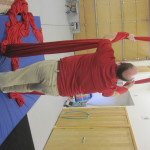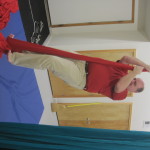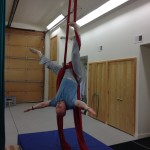Potpourri
==> Gene Callahan sent me this very interesting piece on Bob Dylan and Christian Zionism.
==> Rob Bradley gets a letter in the WSJ about the Paris talks.
==> Apparently you can’t read the Senate torture report if you’re in the Executive branch.
==> Come see Ron Paul, Lew Rockwell, Jeff Deist and me in Houston in late January.
It’s Safer Doing Economics From the Armchair
For Thanksgiving I was in Rochester, and went to see Steve Landsburg give a lecture. (It was great, by the way. I’m sure the students didn’t realize how much better his lecture on two-part pricing was than the typical one.) But beforehand I tried his hobby (click on the thumbnails for better photos):
So now, in addition to integral calculus, we have at least two things at which Steve is clearly better than me.
Contra Krugman Episode 11
Tom and I take on Krugman’s absurd spinning of the horrible ObamaCare news that has come out this month.
Old Obama Footage on Paving the Way to Single Payer
A lot of people–even prominent libertarian economists–have told me they think I’m paranoid for believing that at least some of the architects of the Affordable Care Act knew full well it would lead to a single payer system. (One of their arguments is that the federal government can’t do anything right, how could they pull off such a coup?) Well, a guy in the comments on Facebook for my Daily Caller article posted this video. Then below I’ll post the Harry Reid one, which I had referenced in my article.
Reid in 2013:
A Review of “Arm Yourselves” by Jordan Page
Jordan Page is a singer-songwriter who made a big splash in the liberty movement during the Ron Paul campaign. (Here’s an article on Page and his connection to the Ron Paul movement in the Baltimore Sun.)
I first saw Jordan perform at Porcfest (I think in 2011). Jason Osborne, the guy who walked me over to the pavilion where Jordan was going to play, told me, “He is the Bob Dylan of our times” (or words to that effect). I remember thinking that would be a tall order to fill, but Jordan won me over that night. During that particular performance, I was blown away by Jordan’s remake of a Pink Floyd classic into a song about our current political events.
This Thanksgiving, Jordan is releasing a new single, “Arm Yourselves,” with the accompanying instrumental “Act III” as the B-side (as it were). Apparently the Oathkeepers have adopted it as their national theme song, and I can see why.
With all of Jordan’s original material, “Arm Yourselves” sounds great–for those who don’t know, Jordan is able to show up at a house party and play for 2 hours holding everyone in rapt attention with his one-man concert. But it also has poignant lyrics, including these chilling opening lines:
Friends we gather round together
Holding tight our faith & guns
But in this room I feel something greater than ourselves
Now listen everyoneArms yourselves for the hammer’s crashing down
Arm yourselves all ye citizens
Arm yourselves with the ghost of a risen son
And lay your armor on
There’s no time left, the day has come
Of course, I’m a pacifist, so I don’t necessarily go along with the most obvious interpretation of the song. But Jordan is a solid Christian, and you’ll note the reference to faith and a “risen son.” The spiritual element is clearly seen in the song’s concluding words:
Arm yourselves for the veil has fallen down
Arm yourselves all ye sovereigns
Arm yourselves with the truth and believe
The stage is set, and I foresee a sold out show
Begin Act Three…
To the extent that we are all “arming ourselves” with the truth and an understanding of the economic and military calamities that our ruling elites have set in motion, Jordan’s message is critical.
I have often said that what the liberty movement urgently needs (on the margin) is not more theorists, but more entertainers, film makers, and other artists. Our ideas are clearly superior to those who pine for a stronger State to solve our social ills, but we need to do a better job of broadcasting these ideas to a wider audience. Jordan Page is an excellent example of what we need.
Trying to Pass the Market Monetarist Turing Test
[UPDATE below.]
Suppose someone asks you, “What was the stance of US monetary policy in mid-1980? Pretend you are a Market Monetarist answering.”
BOB TRYING TO PASS AS A MARKET MONETARIST:
First thing, we would not look at interest rates; that is a totally misleading indicator. As Sumner tells us in this post, “Interest rates tell us nothing about the stance of monetary policy.” In context, he is saying that the Fed interest rate cuts in the early 1930s were still consistent with very tight policy.
Instead, let’s look at NGDP and unemployment:
Oh man, there’s a smoking gun, right? The unemployment rate (the data is monthly, too) skyrockets in the middle of 1980, while NGDP growth (blue line) collapses. (The blue line is the level of NGDP, so you can see that it falls way below the previous trend starting in 1980.) Think of all the employers who had signed wage contracts during the late 1970s, and all the consumers who took out home mortgages, expecting NGDP to grow at a brisk pace. The rug was pulled out from them by the tight-fisted Volcker, right around mid-1980.
I mean, some clown might think looking at interest rates is the way to go, but such a person doesn’t understand Wicksell’s “natural rate” concept. Whatever interest rate the Fed targeted in mid-1980, it’s pretty clear it was above the rate consistent with full employment. I mean, it’s not like there was an earthquake in 1980 that kept workers from getting to factories; the above chart clearly shows a recession brought on by super-tight money.
So that’s not bad, right? And we need this perspective in the blogosphere, because you’ve got even prominent economists saying stuff like this:
[W]hen the Fed sharply cut interest rates in the summer of 1980, despite 13% inflation, it was obvious to everyone that they were not targeting 2% inflation, and few people cared. (BTW, Paul Volcker did that insane easy money policy in mid-1980.)
See, this is why you never ever reason from a price change.
P.S. You guys surely know who I’m quoting above, right?
P.P.S. At first I started this post to be ironic, but at this point I really am confused. I have spent years trying to grasp Scott Sumner’s worldview. Maybe it’s the kind of thing where any prolific blogger is going to contradict himself a lot in the eyes of a dedicated h8er, but I swear it seems like this happens a lot, and on his signature issue too. I.e. it’s not like I’m zinging him for inconsistencies in his musical tastes.
UPDATE: I was trying to guess Scott’s possible response, and so I presume he would say Volcker had a super-tight policy in the first half of 1980, and then relented with “insane easy” money in the second half. If you look at the change in NGDP quarter by quarter, that fits. I would still point out (a) in percentage terms, the growth in 3rd quarter 1980 NGDP was lower than it had been for several years closing out the 1970s, so I would think it would throw people in terms of sticky contracts etc. a la Sumner’s model, and (b) regardless, the way Sumner told us Volcker’s policy was “insanely easy” was by looking at interest rates cuts.
ObamaCare’s Not Got a Lot to Be Thankful For This Year
That post title may not be fully grammatical… Anyway I had to do a bunch of this research in preparation for this week’s Contra Krugman (not released yet), so I wrote an op ed that was placed in the Daily Caller. Makes for great Thanksgiving Day conversation.
And remember, if you want the definitive explanation of what went wrong with U.S. health care / insurance, check out my new book with co-author (and ER doctor) Doug McGuff.
Scott Danger Sumner
(Get it?)
Am I the only one who finds this an odd set of statements from the resident monetary expert at EconLog? I’ll add my bold so you see where I’m coming from.
Everyone seems to assume that the zero lower bound is the key problem. But how do we know this? Has the lower bound ever been tested? Not as far as I know.
In standard new Keynesian models…the key assumption is that it’s not possible to pay negative interest on bank reserves. Except that it is possible, indeed it’s been done.
When economists are confronted with this fact, they point out that commercial bank deposits at the Fed and vault cash are near perfect substitutes, and thus negative interest on reserves would merely cause the money to move out of the central bank and into vault cash. However this doesn’t really resolve the issue, as it’s certainly technically feasible to pay negative interest on vault cash.
Indeed it’s technically possible to pay strongly negative interest on bank reserves, including vault cash. How negative? There is no lower bound.
When economists are confronted with this fact they suggest that sharply negative interest rates on reserves would depress bank deposit rates so low (so far negative) that the public would pull money out of the banking system, and hold it as currency.
That is certainly true, but the important question is how much? Today, banks in the US hold nearly $3 trillion in reserves; what if all of that went into circulation? How about $10 trillion, or $15 trillion? Maybe nothing would happen, it would all go under mattresses, or into safety deposit boxes. On the other hand maybe it would create a Latin American-style hyperinflation. We simply don’t know. (I bet on hyperinflation, if the currency stock exceeds $10 trillion.)
I understand all this, but here’s what I don’t understand—why the lack of curiosity? You are in a prison cell. The door to your cell might be locked, or it might be unlocked. You don’t know. But wouldn’t you be curious? Wouldn’t you try to open the door to see if you could freely walk out into the sunshine? Or would you just sit there, day after day, year after year, wondering? Is it locked?
The world’s central banks have chosen to just sit there, wondering. They haven’t tried lowering IOR so far negative that all of the bloated base money floods out into cash held by the public. They aren’t curious. Nor are academic economists. Why not?
P.S. For those who are newcomers to Free Advice, let me give the periodic explanation: I typically read stuff on the internet that I disagree with. So I focus on Paul Krugman and Scott Sumner, because they are the best popularizers of the views that you fix recessions by (a) government spending money and (b) government creating money. I think both views are horribly wrong, and so the best use of my internet time is to go after these two guys. As far as I can tell, nobody else reads them (with a critical eye) as closely as I do.
Perhaps one day Ray Lopez and I will start a weekly podcast titled, “Sorry Sumner.”











Recent Comments